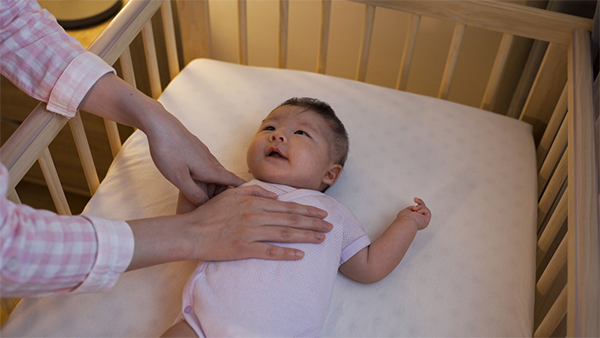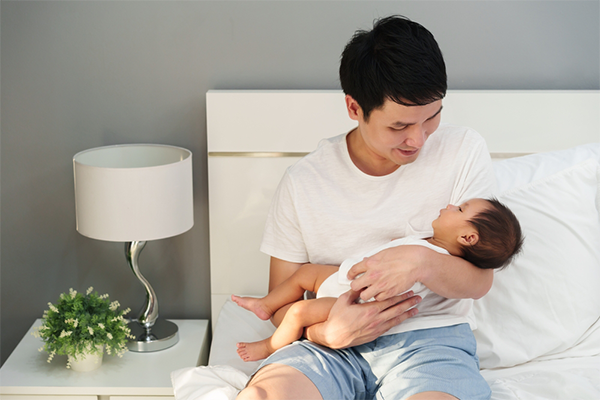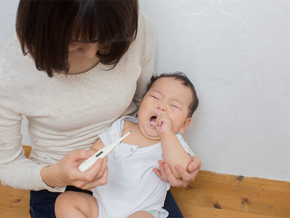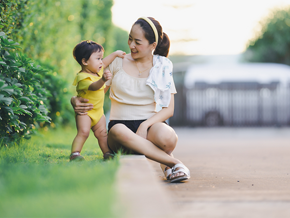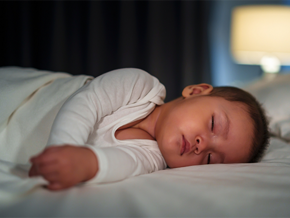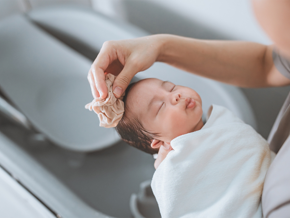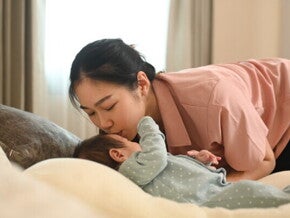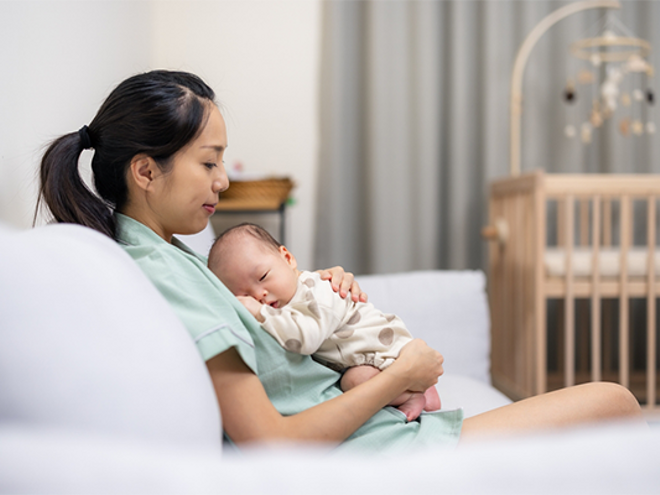
You’ve finally rocked your baby to sleep in your arms, but the moment you gently lay them in the crib, their eyes are wide open again. It’s 2 a.m., you’re exhausted, and you need to know how to help your baby sleep without being held for less stress and more rest for you and your family.
While this nightly struggle is typical, know that it won’t last. This guide gives you simple, practical steps you can start using now. Learn exactly how much rest your little one needs, how to create a calming routine, and what to do when sleep problems arise.
Why Baby Sleep Is Important
According to the Sleep Foundation, sleep helps your baby build brain pathways for thinking and learning while fueling the physical development needed for stronger motor skills.
A 2022 study published in Infant Behavior and Development shows that good sleep habits in the first year can lead to better language and cognitive skills later in toddlerhood.
How Much Sleep Do Babies Need?
Your baby's sleep needs will change quickly from the first few months to the first years. While every baby is different, here are some guidelines from the American Academy of Sleep Medicine (AASM) to help you understand typical baby sleep patterns.
Newborns (0 to 3 months)
The Sleep Foundation notes that the AASM doesn't provide specific guidance for newborns under 4 months old because their sleep patterns fluctuate so much.
Typically, newborns sleep between 16 and 18 hours a day, but this happens in short bursts of a few hours at a time due to frequent feedings.
Infants (4 to 11 months)
At 4 to 11 months, you may notice a more predictable pattern as your baby starts to sleep longer at night. The AASM recommends 12 to 16 hours of daily sleep (including naps) for infants in this age range.
Toddlers (1 to 2 years)
For this age group, the AASM recommends 11 to 14 hours of sleep throughout the day (including naps). Nighttime sleep usually becomes much more consistent during this period, with one or two daytime naps.
Again, sleep patterns can differ from one baby to another. Talk to your pediatrician if you have concerns about your little one's sleep quality or patterns.
Creating an Effective Baby Sleep Routine
Laying your baby down when they are drowsy but still awake teaches them the important skill of falling asleep on their own.
Wondering how to make baby sleep more peacefully? Creating a bedtime ritual tells them it's time to wind down and also supports their emotional well-being. A 2023 study in Frontiers in Sleep found that establishing a routine is linked to better self-control and fewer behavioral problems in the future.
Here are five steps to help you get started on creating one that works.
1. Follow your baby’s sleepy cues.
Observe your baby’s natural sleepy times. Once you notice a pattern, try to set regular times for naps and bedtime each day, leaning towards an earlier bedtime if possible. Research published in 2020 in Sleep Medicine shows that infants who fall asleep earlier get more sleep overall, and keeping them up late is often counterproductive.
A predictable schedule also helps your baby’s body anticipate sleep, making it easier for them to settle down. A 2017 study found that babies’ sleep improved significantly within just the first three nights of starting a bedtime routine.
2. Optimize the sleep environment.
Create an ideal sleep space by keeping your baby’s room dark, cool, and quiet. Use blackout curtains to block stimulating light and dress your baby accordingly to suit the room's temperature.
3. Establish calming pre-sleep activities.
Set up a nightly ritual, which could include a warm bath, changing into pajamas, reading a short story, or cuddling while singing a soft song. This set of steps should take around 30 minutes (or a little longer if you include a bath).
4. Sing a lullaby.
Soft sounds, such as a lullaby or white noise, can soothe your baby to sleep by blocking out other household noises.
Repeating the same sound nightly signals it’s time to rest. Just be sure to keep the volume low and avoid tunes from screens that are too upbeat.
5. Teach your baby to self-soothe.
One of the most effective ways to teach self-soothing is to put your baby in their crib when they're drowsy but awake. Self-soothing helps them learn to fall asleep independently, so if they wake up during the night, they can get back to sleep on their own.
6. Consider sleep training methods.
Sleep training is the process of helping your baby learn to fall asleep independently. Gentle methods allow you to reassure your baby while still encouraging them to settle on their own.
For instance, the Pick Up, Put Down technique involves comforting your crying baby by picking them up. As soon as they’re calm (but still awake), you place them back in the crib to fall asleep. Repeat as often as needed.
The Chair method involves sitting in a chair next to your baby’s crib. Over several nights, you gradually move the chair closer to the door and eventually out of the room.
There’s no one-size-fits-all approach, so choose a method you feel comfortable with and always consult your pediatrician if you're unsure.
7. Practice safe sleep positioning.
According to experts, such as UNICEF, always place your baby on their back to sleep on a firm, flat surface with no loose blankets, pillows, or toys. For younger infants, swaddling can also provide comfort and a sense of security.
Baby Sleep Problems to Watch for and How to Manage
A baby waking up and being fussy can be due to developmental leaps or night terrors.
Even with a great routine, sleep challenges can pop up. Here’s how to handle the most common issues:
Day-night confusion (babies 0 to 8 weeks)
If your newborn is more awake at night and sleepy during the day, you can help reset their internal clock. The American Academy of Pediatrics (AAP) recommends creating a clear contrast between day and night.
During the day, keep the house bright and full of the usual sounds. At night, do the opposite: Keep the lights dim and interactions quiet and brief. Handle feedings and changes calmly to send the clear signal that nighttime is for sleep.
Sleep regressions (babies 4, 8, 12, and 18 months)
Sleep regression is a temporary period during which a baby who was previously sleeping well suddenly starts waking at night or refusing naps. This period usually coincides with major milestones like changes in sleep cycles (around 4 months) or learning to crawl and walk.
The key is to stick to your routine and avoid creating new habits. For example, it’s tempting to start rocking your baby all the way to sleep during a regression, but this can become a new habit they’ll depend on.
Frequent night wakings (babies 8 to 18 months)
If your baby suddenly starts waking up at night, it could be due to separation anxiety, which usually peaks between 8 and 18 months. This anxiety happens because your baby now understands when you leave the room and wants you back.
Other possible causes include teething discomfort or even nightmares (especially as they become toddlers). Regardless of the reason, stick to your routine and comfort them.
Overtiredness (can happen at any age)
Sometimes a baby crying while sleeping or fighting sleep means they’re overtired, which can be due to skipped naps, a late bedtime, or poor-quality sleep. An overstimulated infant, toddler, or child can also have a harder time settling down.
Watch for cues like yawning or eye-rubbing and begin the routine before fussiness sets in.
FAQs About Baby Sleep
When will my baby sleep through the night?
By 4 to 6 months old, many babies can sleep for five to six hours straight at night. However, every baby develops at their own pace, so this can vary.
Should I wake my baby to feed?
In the first few weeks, you may need to wake your newborn for feedings if they haven’t regained their birth weight. Your pediatrician will provide guidance on when you can stop waking them.
When should I talk to a doctor about my baby’s sleep?
If you have concerns about your baby’s breathing, extreme fussiness that isn’t getting better, or poor weight gain, it’s always best to consult your pediatrician.
Helping your baby sleep better can be both challenging and rewarding. Remember to be patient and stay consistent with your routine; soon, you'll find a rhythm that works for your family.
Have more questions about baby sleep? Join the conversation and connect with other parents in the ParentTeam Moms and Dads Facebook group.
References
BetterHealth Channel. "Typical Sleep Behaviour (1) – Newborns 0 to 3 Months." Accessed August 19, 2025. https://www.betterhealth.vic.gov.au/health/healthyliving/typical-sleep-behaviour-nb-0-3-months
Callender, Ealena. "12-Month Sleep Regression." Sleep Foundation. Updated July 15, 2025. Accessed August 19, 2025. https://www.sleepfoundation.org/baby-sleep/12-month-sleep-regression
Centers for Disease Control and Prevention. "Helping Babies Sleep Safely." CDC. September 25, 2024. Accessed August 19, 2025. https://www.cdc.gov/reproductive-health/features/babies-sleep.html
Children’s Hospital of Philadelphia. "Newborn-Sleep Patterns." Accessed August 19, 2025. https://www.chop.edu/pages/newborn-sleep-patterns
Fry, Alexa. "When Do Babies Sleep Through the Night." Sleep Foundation. Updated July 15, 2025. Accessed August 19, 2025. https://www.sleepfoundation.org/baby-sleep/when-do-babies-sleep-through-night
Healthline. "How to Identify and Manage Being Overtired." Last medically reviewed August 10, 2018. Accessed August 19, 2025. https://www.healthline.com/health/overtired
Korownyk, Christina, and Adrienne J. Lindblad. 2018. "Infant Sleep Training: Rest Easy?" Canadian Family Physician64 (1): 41. https://pmc.ncbi.nlm.nih.gov/articles/PMC5962992/
Mayo Clinic. "Should I Wake My Newborn for Feedings?" April 11, 2025. Accessed August 19, 2025. https://www.mayoclinic.org/healthy-lifestyle/infant-and-toddler-health/expert-answers/newborn/faq-20057752
Mindell, Jodi A., and Ariel A. Williamson. 2018. "Benefits of a Bedtime Routine in Young Children: Sleep, Development, and Beyond." Sleep Medicine Reviews 40 (August): 93–108. https://doi.org/10.1016/j.smrv.2017.10.007
Moon, Rachel Y. "How to Keep Your Sleeping Baby Safe: AAP Policy Explained." HealthyChildren.org. Last updated June 6, 2025. Accessed August 19, 2025. https://www.healthychildren.org/English/ages-stages/baby/sleep/Pages/a-parents-guide-to-safe-sleep.aspx
NHS. "Helping Your Baby to Sleep." Last reviewed January 28, 2025. Accessed August 19, 2025. https://www.nhs.uk/baby/caring-for-a-newborn/helping-your-baby-to-sleep/
Raisingchildren.net.au. "Baby Sleep at 2-12 Months: What to Expect." raisingchildren.net.au. Last updated January 21, 2025. Accessed August 19, 2025. https://raisingchildren.net.au/babies/sleep/understanding-sleep/baby-sleep-2-12-months
Ruggeri, Amanda. "The Science of Healthy Baby Sleep." BBC Future. February 9, 2022. Accessed August 19, 2025. https://www.bbc.com/future/article/20220131-the-science-of-safe-and-healthy-baby-sleep
Schlieber, Marisa, and Jisu Han. 2021. "The Role of Sleep in Young Children’s Development: A Review." The Journal of Genetic Psychology 182 (2): 83–95. https://doi.org/10.1080/00221325.2021.1908218
Stanford Medicine Children’s Health. "Infant Sleep." Stanford Medicine Children’s Health. Accessed August 19, 2025. https://www.stanfordchildrens.org/en/topic/default?id=infant-sleep-90-P02237
Summer, Jay Vera. "What Is the Best Room Temperature for a Sleeping Baby?" Sleep Foundation. Updated July 15, 2025. Accessed August 19, 2025. https://www.sleepfoundation.org/baby-sleep/best-room-temperature-for-sleeping-baby
Suni, Eric. "4-Month Sleep Regression." Sleep Foundation. Updated July 15, 2025. Accessed August 19, 2025. https://www.sleepfoundation.org/baby-sleep/4-month-sleep-regression
Suni, Eric. "8-Month Sleep Regression." Sleep Foundation. Updated July 15, 2025. Accessed August 19, 2025. https://www.sleepfoundation.org/baby-sleep/8-month-sleep-regression
Suni, Eric. "Sleep Training for Babies." Sleep Foundation. Updated July 21, 2025. Accessed August 19, 2025. https://www.sleepfoundation.org/baby-sleep/sleep-training










